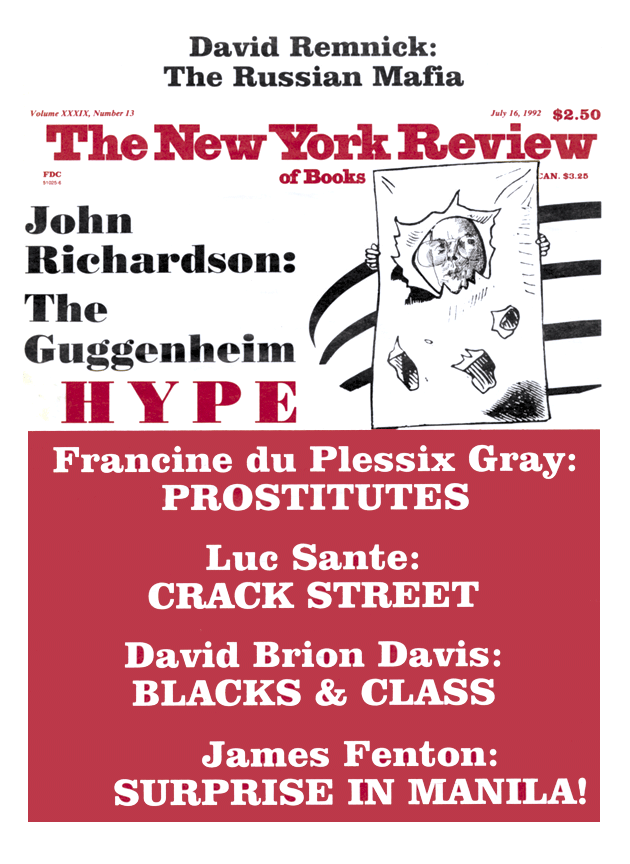In response to:
Lagoon Tunes from the April 9, 1992 issue
To the Editors:
Robert Craft’s otherwise informative review of H. C. Robbins Landon and John Julius Norwich’s Five Centuries of Music in Venice [NYR, April 9] contained the curious description of Barbara Strozzi as “history’s only renowned female composer.” I wonder on what grounds he makes this judgment. According to Ellen Rosand’s essay in Women Making Music (Illinois, 1986), Strozzi lacked support for her compositional career following the death of her adopted father, and her own death date is unknown; she disappears from history following the publication of her op. 8 Arie in 1664. Compared to the career of say Elisabeth-Claude Jacquet de la Guerre, upon whose death a commemorative medal was struck, “renowned” cannot have meant having “widespread honor and fame” as my dictionary suggests. Strozzi’s compositions are indeed lovely and important works and deserve more attention than they’ve received, but claiming her “history’s only” does a great disservice to the many other female composers before and after Strozzi; Francesca Caccini and Fanny Mendelssohn Hensel come to mind as do Hildegard of Bingen and Ruth Crawford, but the list could go on and on. Although Mr. Craft questions the lack of information on Strozzi provided by Misters Landon and Norwich, he seems to have been as “distracted” by the portrait of a female musician as he claims they were. Again according to Rosand the portrait in question may not be of Barbara Strozzi at all. Mr. Craft’s later reference to this same portrait as a “period pin-up” not only suggests his assumption of the male gaze of his readership (why would I, a female musicologist, buy a work for a pin-up?) but perpetuates the connection between female musicality and sexual promiscuity that dogged Strozzi and her many like-minded and talented sisters and continues to make female creativity in music a suspect act of audacity where nice girls need not apply.
Susan C. Cook
Associate Professor of Music
Women’s Studies
University of Wisconsin
Madison, Wisconsin
Robert Craft replies:
The “judgment” is borrowed from the book, which describes Strozzi as “the most famous” female composer in history. But the dimness and obscurity of the contenders that Associate Professor Cook has dredged up and chosen from an “on and on” list of “many” others, does not convince me that it is wrong (except that any attempt to measure fame over several centuries is invidious nonsense). Fanny Mendelssohn Hensel’s “renown,” like Clara Schumann’s, derives from her name far more than her music.
Ms. Cook contradicts herself. Strozzi cannot have disappeared from history so long as her “lovely and important” music survives. Moreover, the portrait, whether or not of Strozzi, has kept “Strozzi” alive these three hundred years.
I doubt that, by itself, “the connection between female musicality and sexual promiscuity” can have dogged “female creativity” to the extent of having prevented the appearance of a major female composer. To answer Ms. Cook’s question—“why would I,” etc.—she can hardly be unaware that the term “pin-up” is no longer restricted to sex idols (viz. Dylan Thomas’s “the pin-up poets”), and that a “female musicologist” and “nice-girl” musician could quite reasonably wish to acquire the picture of a female composer.
For the rest, Ms. Cook’s ungrammatical sentence comparing a “career” and a word (“‘renowned”‘) is incomprehensible to me.
Vive the power of the female to “distract,” in my sense, since, for better or worse, it ensures the continuation of the species and the possibility, at least, of more and greater female composers.
This Issue
July 16, 1992


